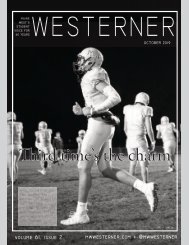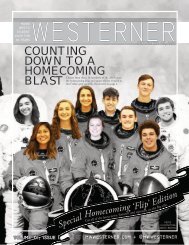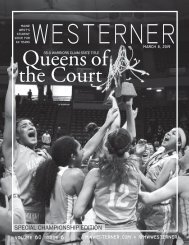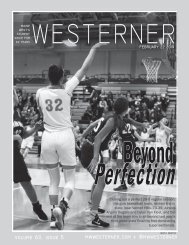You also want an ePaper? Increase the reach of your titles
YUMPU automatically turns print PDFs into web optimized ePapers that Google loves.
6 features<br />
<strong>March</strong> 2, <strong>2018</strong><br />
W<br />
BY MASOOMA SULTAN<br />
reporter<br />
Dozens of Orchesis members practice<br />
for their shows next week.<br />
hit the lights<br />
GRETA SORENSON<br />
Featuring tap inspired by the According<br />
movie “Up,” a dramatic adagio piece to senior Sandra<br />
to a song from “The Great Showman,”<br />
George, the<br />
and audience-participation majority of the<br />
trivia between dances, this year’s dances are created by the<br />
Orchesis show, called “Light, Camera,<br />
students themselves. “This year, the<br />
Orchesis!” features the talents of dances are mostly all choreographed<br />
dozens of West’s best female and male by the girls from Orchesis, and you<br />
dancers.<br />
can really see the creativity and ideas<br />
Orchesis troupe members will being brought to life by the dancers.<br />
showcase their talents this Thursday There are also a lot of dances choreographed<br />
at 4 p.m. with additional performances<br />
by just fourth-year members<br />
on <strong>March</strong> 9 and 10 at 7 p.m. — Jackie Chiakas, Ella Kurutz and I,”<br />
This production is inspired by George said.<br />
movies and television shows. In fact, Orchesis members have worked<br />
“all of the songs in the show are either diligently, with Monday rehearsals<br />
from a movie or relate in some way from 3:30-9:30 p.m. each week since<br />
to a movie or TV show,” senior Greta October, and they have devoted their<br />
Sorensen said.<br />
time to create a wonderful show. “I’m<br />
Striking the right chords<br />
PLAYING AN INSTRUMENT AMPLIFIES BRAIN REGIONS THAT ENHANCE NON-MUSICAL ABILITIES TOO<br />
so excited for Maine West to see<br />
all our hard work and dedication<br />
pay off, because I think this is going<br />
to be one of our best shows yet,”<br />
Sorensen said.<br />
Unique to this year, the entire<br />
Orchesis troupe competed in the<br />
state qualifiers with a salsa-jazz hybird<br />
to “Danza Kuduro” from “Fast<br />
and Furious” on Feb. 10, which will<br />
be featured in next week’s shows in<br />
the Maine West auditorium. Also,<br />
a contemporary dance titled “If I<br />
Stay” choreographed by sophomore<br />
Kimberly Fairhead was featured in<br />
the state qualifiers as well as Danza<br />
Kuduro, but this specific dance was<br />
granted the opportunity to perform<br />
at state.<br />
Charles Dickens, Albert Einstein,<br />
Thomas Edison, Neil Armstrong -- all<br />
are all known for their contributions<br />
and achievements in English,<br />
science, entrepreneurship,<br />
and space travel, but these prominent figures<br />
also had another thing in common: they<br />
all played musical instruments.<br />
The skills of a musician are credited<br />
with improving cognitive performance<br />
and helping in a variety of non-musical<br />
contexts, too. Sophomore Alexis<br />
Huerta explained how, with practice,<br />
he has improved his hand-eye coordination<br />
when playing his instrument.<br />
“Playing trombone helps me with my hand-eye<br />
coordination, there’s no buttons on [my trombone],<br />
so being able to control my hand is difficult,” Huerta<br />
said. “I used to have terrible hand-eye coordination;<br />
it’s difficult to get a perfect note that’s centered, but<br />
I’ve gotten better at it with practice.”<br />
When playing an instrument, the parts of the<br />
brain that control hearing and memory become<br />
more active. “According to fMRI scans of the brain,<br />
those who play instruments are superior at integrating<br />
sensory information from touch, sight, and hearing,”<br />
AP Psychology teacher Patricia Montgomery<br />
said. “This translates to the likelihood of one applying<br />
the same ability in learning a variety of nonmusic-related<br />
material, using various parts of the<br />
brain. Using different<br />
structures of the<br />
brain and increasing<br />
66%<br />
of students who play an instrument<br />
say that doing so<br />
gives them an advantage in<br />
subjects besides music*<br />
neural connections<br />
makes it more likely<br />
for a person to learn<br />
and retain any information,<br />
especially<br />
if they enjoy what<br />
they’re learning.”<br />
As a 2014 study from the University of Liverpool<br />
shows, musical training increases the blood flow in<br />
the left hemisphere of the brain; since language skills<br />
align with the left hemisphere of the brain, being a<br />
musician can help with language skills.<br />
Playing an instrument, though, is not an easy<br />
feat. “Learning how to play piano was frustrating<br />
at first, because you have to able to coordinate one<br />
hand with the other hand,” junior Danica Roque<br />
said. “Having self-discipline is demanding, but you<br />
learn from it and get better.”<br />
As sophomore Olivia Bitcon explained, however,<br />
BY IVONNE SANCHEZ<br />
reporter<br />
Sorensen, who is among the seniors<br />
who are performing in their final<br />
shows, said, “I’m really excited to<br />
perform with this team one last time,<br />
even though it will be bittersweet.<br />
I’m definitely going to miss Orchesis<br />
and all the fun memories I’ve made<br />
from it. Through endless hours of<br />
rehearsing, we’ve become like a big<br />
family.”<br />
“I definitely wouldn’t trade the<br />
four years I have spent on Orchesis<br />
because I have made so many friendships<br />
and memories and I feel like I’ve<br />
gained 22 sisters. I’m bittersweet that<br />
it’s my last year but I feel like I have<br />
made it count,” George, a 4th year<br />
member, said.<br />
the stress from playing an instrument is sometimes<br />
helpful. “[Playing an instrument] is good stress that<br />
relieves bad stressors,” she said.<br />
Playing an instrument also helps people learn<br />
how to problem-solve. “Usually when I come across<br />
a problem I take a step back, look at it as a whole,<br />
and figure out what parts of it to fix first. It resembles<br />
how I would practice music,” Bitcon said.<br />
In addition to problem solving, woodwind and<br />
brass players are able to apply the breathing techniques<br />
they learn with their instruments to sports. “I<br />
don’t get as tired while I play soccer because I’m used<br />
to controlling my breathing and not hyperventilating,”<br />
Huerta said.<br />
Performing music requires a consistent meter,<br />
and being able to keep a consistent pace is something<br />
that has benefits beyond reading a musical<br />
score. “Learning how to play my instrument steers<br />
me away from procrastination, and propels me to<br />
work harder,” Roque said.<br />
Playing an instrument “has many benefits I had<br />
never thought of before,” junior Davis Parks said.<br />
For example, “it teaches you that the only way to be<br />
better at something is to enjoy doing it, and to enjoy<br />
overcoming the challenge.”


















